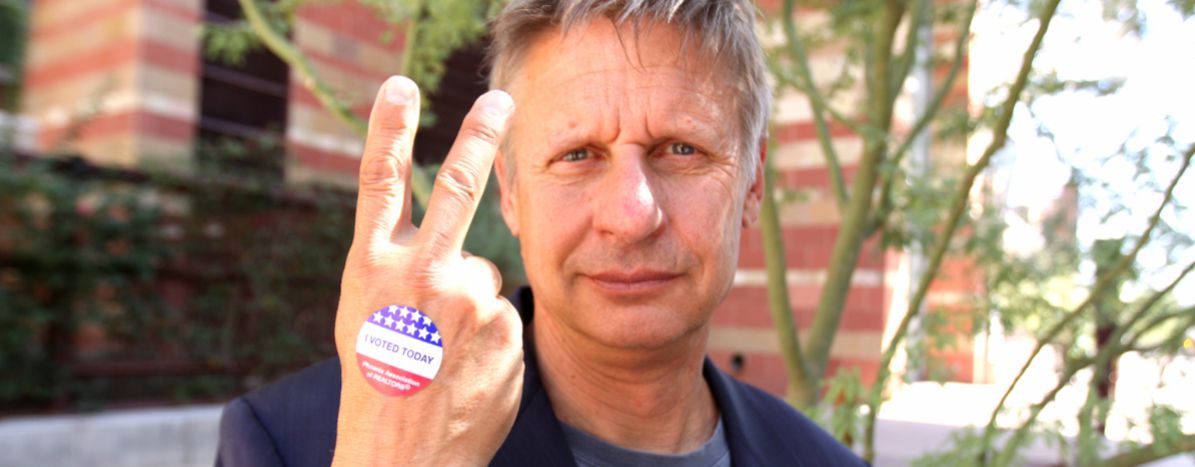
Romania and the question of third party candidates
Published on
As election day draws near, the entire world is waiting on the edge of their seats to find out who will be the President of the United States. Will Hillary Clinton make history as Amercia's first female president? Will there be a Brexit-type shift that will allow Donald Trump to prevail? Or will we be surprised by a wild card?
It appears that this election, more than in any previous one, third party nominees are considered a strong choice for many American voters. Both the Green Party’s Jill Stein and Libertarian Gary Johnson have won the support of a growing number of Americans who feel disillusioned by the promises and the reputation of both Clinton and Trump.
Both candidates are a far cry (some say a breath of fresh air) from the usual presidential nominees. Stein has a medical background and has been a passionate advocate for green-living for many years. She shows a genuine interest in smaller communities that have so far only been used as leverage by past nominees and since the 90s has worked on reducing toxic exposure in these places. Johnson is the former New Mexico Governor whose most impressive achievement is his cutting of state taxes while improving infrastructure and schooling. With all this evidence of success, will this be the year of the underdog?
The most reasonable alternative to a crystal ball is to look towards other countries that have dealt with similar situations in the past.
On the surface, the forthcoming American presidential elections have nothing in common with Romanian parliamentary elections. However, in both cases the main candidates’ multiple flaws and gaffes have bred reluctance among the electorate of both countries. Of course, all this raised doubts about the candidates’ reliability and fairness. Racial discrimination, immigration and climate change ignited conflicts and American society eager to find out how campaigners would sort things out. Romanian society, on the other hand, looks hopeless when politicians' decisions seriously affect their lives.
The country has been struggling hard since the last presidential elections in 2014 to change mentalities and work towards a more prosperous future. The 2014 elections were the result of public outcry against the corruption, abuses and dishonesty that PSD (Social Democrat Party) or PDL (Liberal Democrat Party) politicians never tried too hard to conceal. President-elect Klaus Iohannis became what voters pinned their hope in, after a long, long wait. Nevertheless, as not all dreams come true overnight; there was still time for a bitter pill.
Fed up with disappointments, part of the constituency, especially Millenials, turned to local political movements like POL (Free People’s Party) in Târgu Mureș or USR (Save Romania Union) led by Nicușor Dan in Bucharest, as they seemed to share the same ideals.
"Transparency, cutting down on bureaucracy, decentralisation, fiscal reform should be the common points of a future alliance of the new political movements for the parliamentary elections," Dan Masca, leader of POL, said in one interview. This rhetoric is similar in style and promise to that of Gary Johnson, who pledges an improvement to the current administration. This is why members of the young generation still look up to him.
On the subject of controversies, main Romanian parties PSD and PDL had a heated debate on whether or not accusations of fraud, embezzlement and bribe should bear relevance to the reliability of their parties. In the case of PSD members who faced accusations of this kind, the party jumped to their rescue, claiming benefit of the doubt.
Conversely, Silviu Ioniță, former Dean of Pitești University, is strongly against such a practice: "The slightest doubt should make anyone ineligible for a public position." However, many voters, with no second thought for the consequences, were in favor of candidates facing such indictments. The lack of proper political education and misinformation obviously led to this confusion.
On the other hand, Nicușor Dan, founder of USR, attempted to inform misled voters with regards to the PSD’s strategies: “The former governments would rely on their own members appointed as ministers, state secretaries, prefects, school principals, and make sure their politics is applied according to their own interests and not to the community’s.”
In Romania, USR is a party conceived from people’s disappointment with the failure of major parties PSD and PDL. They are a beacon of hope for the electorate, much in the same way as the Libretarian and Green Parties are in the US. Their numbers in the polls are steadily rising because of the change in mindset they promote. While the third-party candidates’ policy suggestions in the US include legalizing marijuana and ridding students of their astronomic debts, in Romania USR wants to implement changes in health, education and infrastructure that are more in line with Prime Minister Dacian Cioloș’ moral and social principles.
"USR is no longer a small party – no longer insignificant, Mr. Ioniță added." It is a real alternative to voters’ previous choices. As for the US, electing a Head of State from outside the two main parties may bring on a welcome change."
Nonetheless, in both the USA and Romania there seems to be insecurity and distrust looming at the horizon. Speaking about the elections in Romania, the philosopher and former Culture Minister Andrei Pleșu said: "We are witnessing a fight in a bazaar, a cock fight, a squabble among the gipsy women: the stupid claim to be smart, the criminals pretend to be monks, the impudence and the lack of common sense are obvious. This is how Romania looks like on the eve of the elections."
It's also a fairly accurate portrait of the last year in US politics.



